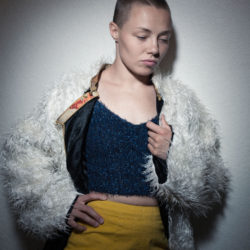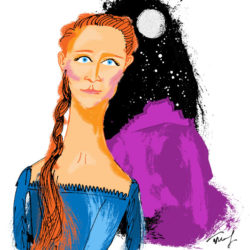Madeline Brewer was fixed on a life in musical theatre – before her first audition out of drama school changed her path – and her outlook – forever.
PHOTOGRAPHER ANDREAS NEUMANN ART DIRECTOR ELLA MCNANEY FASHION STYLIST JASMINE BENJAMIN HAIR STYLIST BOBBY ELIOT MAKE-UP ARTIST JENNA KRISTINA PRODUCTION VENI MAGAZINE PRODUCTION ASSISTANT NORIO CHALICO, ANIKA NORRGARD, CATHERINE FORSYTH INTERVIEW CHRISTIAN CHENSVOLD







Playing Tricia Mille on Jenji Kohan’s powerhouse Netflix series Orange is the New Black, opened Brewer’s eyes to the potential of television. It could effect change not only in society she saw – but within herself. From roles in Hemlock Grove and Black Mirror, to her star turn as Janine/Ofwarren in Hulu’s Emmy- and Golden Globe-winning The Handmaid’s Tale, Brewer has explored increasingly complex characters in ever more challenging dramas. At 26, such work has shaped her, and forged a resolute dedication to exploring ‘difficult’ topics that finds its apotheosis in her new film, Cam.
VM: Did you have a clear idea of the path you wanted when you graduated drama school?
MB: I wanted to play Elle Woods, and Glinda on Broadway. I thought I’d be going to open calls for non-union musical theatre jobs. Instead, I met an agency that wanted to put me up for everything. When Orange is the New Black came up, I was like, OK, a web series…cool…and I also thought they were insane sending me out for a cornrowed drug addict. It was my first on-camera audition ever and I was shaking like a leaf.
VM: Has it been champagne and roses ever since?
MB: People think that if you’re on TV, you have all this money, but that’s not true – at all. Before Orange, I was working two jobs – at Victoria’s Secret, and as a waitress in New York – and I kept waitressing during and after the show. My next job was Hemlock Grove – I moved to Toronto for six months – but then back to NYC, where I moved in with a friend in Chinatown. The apartment smelled terrible, it was really small, and you couldn’t open the bathroom and refrigerator doors at the same time. It’s been by no means seamless, and no actor will ever tell you, “This is the easiest thing ever!” I don’t even think that Jennifer Lawrence would say that.
VM: Acting can be a nomadic lifestyle. Is that something you like or loathe?
MB: You know, there are several things I don’t like about this job. It’s stressful and frustrating, and really takes a toll on you emotionally, and on your family – my mom goes through every up and down with me. Sometimes that’s enough to make me be like, “I am never doing this again.” But when it’s good, it’s so good. I am a hyper emotional person and when I’m working, I channel all of that; it’s so freeing, and it makes so much sense to me. And the fact that this career requires you to move all over the place? I am my best self when I’m travelling. I love packing a bag and going, going, going…
“Being a citizen of the world now, and of this country, if you are not paying attention, then you’re being actively ignorant. Ignorance is not something I ever want to choose.”
VM: You’ve worked on two of the most groundbreaking TV dramas in recent times. How have they affected your career, and your outlook on the world?
MB: Being on Orange and Handmaid’s Tale has been eye-opening for me. They’ve made me realize that so much good can come from TV, because you’re literally bringing stories into people’s living rooms. These are shows that have revolutionized television, and made people think. The latter is supposed to be this crazy dystopia that’s so far from reality, but so many places around the world – not least the United States – are on their way to Gilead. The idea that we’re trying to put forward is: if you stay awake, you stay aware. Don’t let Gilead happen to you – because it can. Being a citizen of the world now, and of this country, if you are not paying attention, then you’re being actively ignorant. Ignorance is not something I ever want to choose.
VM: Your new film, Cam, sheds light on the world of online sex workers. Why was it important to you to explore that?
MB: Cam is showing that sex work is real, people do it, and watch it, and enjoy it – and there’s nothing wrong with that. Sex workers aren’t second class citizens; they shouldn’t be punished or victimized – that’s not how the world should work. What we do with art in any form is to hold a mirror up to society and say: this is who you are. And then offer the alternative: this is who you could be.



